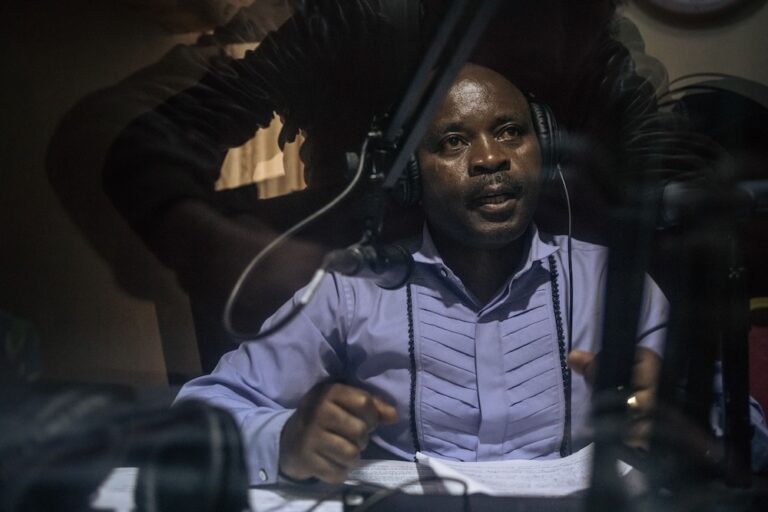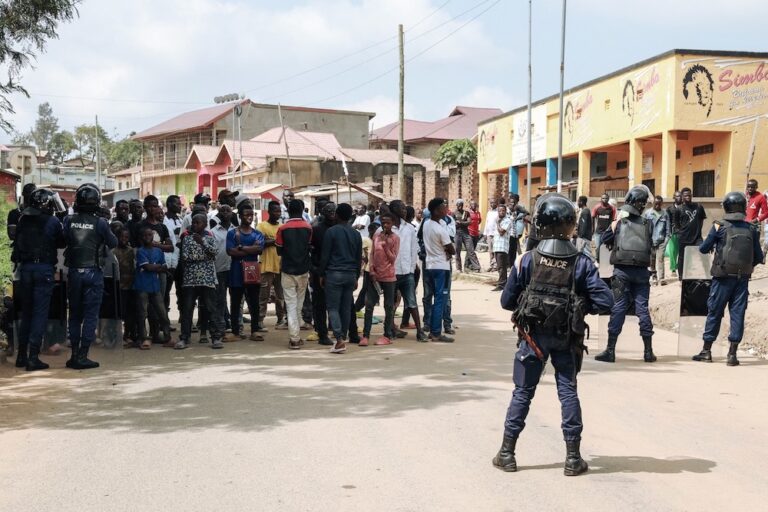(JED/IFEX) – The following is a 9 December 2003 JED press release: JED publishes its 2003 annual report and launches a national campaign for the decriminalisation of press offences in the DRC Kinshasa, 9 December 2003 Journaliste en danger (JED), a Democratic Republic of Congo (DRC) based independent, non-partisan organisation that defends and promotes press […]
(JED/IFEX) – The following is a 9 December 2003 JED press release:
JED publishes its 2003 annual report and launches a national campaign for the decriminalisation of press offences in the DRC
Kinshasa, 9 December 2003
Journaliste en danger (JED), a Democratic Republic of Congo (DRC) based independent, non-partisan organisation that defends and promotes press freedom, published its 2003 Annual Report on the state of press freedom in the DRC on Tuesday 9 December 2003. The report was presented at a gathering at Kinshasa/Gombe’s Notre Dame de Fatima Theatre. JED also announced the launch of a national campaign for the decriminalisation of press offences in the DRC.
JED’s 2003 report highlights the improving press freedom situation in the country. Overall, JED registered 66 cases of attacks on press freedom in 2003. This figure stood at 67 in 2002. This represents a very small improvement, but JED noted that the improving situation is more noticeable when attacks are examined by category. As of the publication date of the 2003 report, no journalists are imprisoned for carrying out their work in the DRC. This represents a significant milestone when one considers that it is the first time since 1997 that the DRC is marking the anniversary of the Universal Declaration of Human Rights with no journalists in prison. On the same date in 1998, there were two journalists in prison, three in 1999, four in 2000, one in 2001 and 2002. In another encouraging development, only two journalists were detained for over 48 hours for reasons associated with their profession in 2003. The figure stood at 16 in 2002.
After presenting the 2003 report, JED’s president launched a national campaign for the decriminalisation of press offences in the DRC. The campaign will run from 10 December 2003 to 3 May 2004. Several activities are planned, including a workshop in January in Kinshasa entitled, “Why and how to decriminalise press offences in the DRC”, a satirical cartoon contest for Kinshasa students, a theatre tour in Kinshasa neighbourhoods, and a march that will be followed by a concert. A multimedia campaign, including television and radio spots, posters, streamers and messages will be launched throughout the DRC as of Wednesday 10 December.
During its presentation, JED also thanked CAF/SCO, a Dutch organisation that is funding the national campaign. The main goal of the campaign is “to encourage Congolese lawmakers to abolish prison terms for press offences other than those involving incitement to ethnic or racial hatred, violence or crime”.
About 100 guests (members of parliament, senators, diplomats and journalists) attended the event, including Mr. Mulegwa Zihindula, President Joseph Kabila’s spokesperson, and Modeste Mutinga, president of the High Authority for Media, who declared his enthusiastic support for the campaign.


